By Byron Mutingwende
Journalists have reiterated that the prevailing working conditions in the media are not safe for them to carry out their mandate safely amid calls for gender equity in the sector.
This emerged at a two-day workshop organised by the Zimbabwe Union of Journalists (ZUJ) to train media practitioners on Gender Equity and Safety held at the Cresta Oasis Hotel in Harare.
In his remarks, ZUJ Secretary-General, Foster Dongozi bemoaned the resurgence of sexual harassment, particularly against female journalists, that had become rampant in the newsrooms.
“The level of sexual harassment in the media is worrisome in most newsrooms in the Southern African countries, Zimbabwe included. As the Sothern African Journalists Association (SAJA), Zimbabwe decided to second two female journalists (Pamela Shumba and Victoria Mhlanga) to a training workshop on media safety and gender equality that was sponsored by the Union of Journalists. The two are now training other journalists in the country on issues of gender and safety in the media,” Dongozi said.
In her presentation at the workshop, Pamela Shumba bemoaned an upsurge in the violation to journalists’ rights globally.
These violations occur whenever a journalist is denied any right to carry out their work. Such violations include, among others the murder, torture or kidnapping of a Journalist; the arrest of a Journalist without any reason; searching media agencies without permits as well as death threats and harassment intended to silence a Journalist through fear and self-censorship,” Shumba said.
Regrettably, journalists the world over, though un-armed, are being targeted by enemy combatants. The violations also include punishment of journalists for a report that may have condemned a specific group, party, or Government as well as surveillance of journalists’ activities.
Shumba also took a dig at the direct discrimination in newsrooms which occurs when women are prevented from enjoying their rights and freedoms simply because they are women.
That occurs despite the fact that women journalists can help drive the debate beyond guns and fighting. It has been proven that local women journalists can provide a better understanding of what women need to take better care of their families and safe guard themselves, but often that comes with challenges.
“Society should understand that gender equity is not a women’s issue . It is every body’s issue and we need men and women to make this a priority. If we do not have women in decision making roles, in unions and their perspective represented in the media cannot reflect its duties to society.”
In Zimbabwe, while women are more present in journalism and unions than ever before, still few have accessed leading roles. This means that there’s still a gender pay gap, a struggle to reconcile work and private life and issues like harassment and bullying.
Shumba said that as a panacea to the challenges, there was a need to create flexible work conditions and facilities, understand the needs of women, establish sexual harassment committees as well as putting in place a gender-sensitive code of ethics and guidelines for reporting on women.
The female journalists present at the meeting, who requested anonymity, said that there was a need to improve the remuneration of female journalists so that they will be protected from abuse as they seek to supplement their income to meet their needs.






